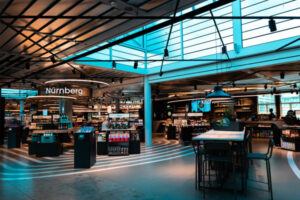By Thimo Schwenzfeier
When the Dutch trend researcher Li Edelkoort recently talked in favor of consumption from his quarantine, retail was already locked and loaded to somehow make up for the lost weeks. However, there is one issue that got a little drowned out in the current crisis, even though it was the clear #1 issue at consumer goods fairs at the beginning of the year: Sustainability.
The Neonyt, the world’s most relevant fair for sustainable fashion during Berlin Fashion Week, reported absolute record numbers. 23 percent more exhibitors and twice as many industry visitors as in summer of 2019. The increase in the conventional retail sector was particularly striking. Sustainability is the most exciting topic for retail, even though there are still many questions that need to be answered. Starting with the myriad of seals and certificates to the insecurity when it comes to range design–green and sustainable labels mixed versus green corners–as well as from margins to additional and intermediate supplies and POS support. A learning from January was that many sustainable brands have done their homework.
Consumers are also very much attracted to sustainability. 57 percent of Germans are strongly interested in green products. But only 41 percent feel well informed about the options for sustainable consumption. Particularly the target group of 16- to 29-year-olds is in need of significantly more information.
This is exactly the advantage that stationary retail has over e-commerce. One-on-one consultations convey a product’s history–even from a distance. Consumers can be made aware of the positive attributes of sustainable products if they are staged appealingly and informatively. In addition, retailers can position themselves as being future-oriented with the corresponding communication. They provide customers with the seemingly lost, good feeling that shopping can give them and which they have been searching for years. A lost feeling that drove them more and more into the arms of online providers.
It is important to accept that sustainability is not a short-lived trend. This issue will not just go away to make room for the next hype. Even though the focus has currently shifted a bit due to the corona crisis, sustainable consumption will come back even stronger after the crisis. Fridays for Future, Earth day or the Fashion Revolution Week are just a few examples of a young, global movement that is only just beginning to fight for its market relevance. Retailers and brands that identify with this issue sincerely and early on, and base their positioning on it, will also be successful in the future.
Hopefully, consumption will soon be able to leave its quarantine behind completely. And then we are on our way towards a sustainable future. Li Edelkoort said right before the crisis that this way is a source of hope. Very entertaining and with lots of challenges, but not frightening.






